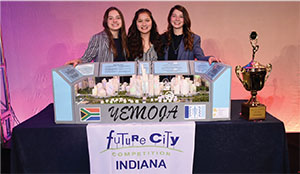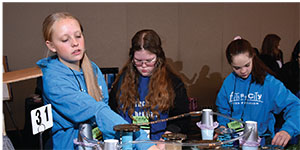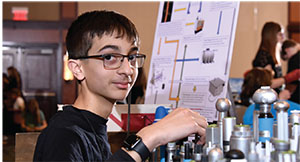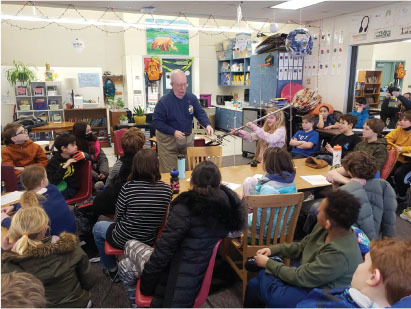March/April 2020
Variables
Fresh Ideas on Clean Water
 YEMOJA, NAMED AFTER THE AFRICAN GODDESS OF THE OCEAN FROM THE YORUBA RELIGION, TOOK THE GRAND PRIZE IN THE 2020 FUTURE CITY COMPETITION.
YEMOJA, NAMED AFTER THE AFRICAN GODDESS OF THE OCEAN FROM THE YORUBA RELIGION, TOOK THE GRAND PRIZE IN THE 2020 FUTURE CITY COMPETITION.One of the greatest engineering feats of the 20th century was the distribution of clean drinking water to a growing US population that was moving from rural to suburban and urban locations. Still, in the 21st century, drinking water risks are many, but a new group of young problem-solvers has been hard at work on next-gen solutions.
On February 18, those ideas were on display in Washington, DC. At the annual Future City Competition Finals, teams of sixth-, seventh-, and eighth-graders introduced their solutions to an ongoing challenge: Identify a threat to an urban water system and develop a futuristic solution that would ensure a reliable supply of clean drinking water.
 THE OKLAHOMA TEAM EARNED THE AWARD FROM THE NATIONAL COUNCIL OF EXAMINERS FOR ENGINEERING AND SURVEYING FOR BEST LAND SURVEYING PRACTICES.
THE OKLAHOMA TEAM EARNED THE AWARD FROM THE NATIONAL COUNCIL OF EXAMINERS FOR ENGINEERING AND SURVEYING FOR BEST LAND SURVEYING PRACTICES.For the first time, a team from Indiana not only placed among the top five winners for the Future City Competition Finals, but also took home the grand prize. Students from Norwell Middle School in Ossian, Indiana—population 3,360—were the big winners. Even the team was caught off guard by their victory. “It’s amazing because our school is small and in the middle of nowhere,” said team member Teagan Lesley.
The Indiana team won $7,500 for their STEM program and a trip to US Space Camp in Huntsville, Alabama.
NSPE sponsored the $5,000 second place award. This year, the award went to the Great Plains region, Southwest Middle School in Lawrence, Kansas. Third place, $2,000, was awarded to North Carolina’s Langtree Charter Academy in Mooresville.
 A MEMBER OF THE IOWA TEAM, WHICH WON THE AWARD FROM THE PROJECT MANAGEMENT INSTITUTE EDUCATIONAL FOUNDATION FOR BEST FUTURE CITY PROJECT PLAN.
A MEMBER OF THE IOWA TEAM, WHICH WON THE AWARD FROM THE PROJECT MANAGEMENT INSTITUTE EDUCATIONAL FOUNDATION FOR BEST FUTURE CITY PROJECT PLAN.
NSPE also sponsors the Professional Engineering Award for “Protecting the Public’s Safety and Welfare Through Competent and Ethical Engineering Practices.” Executive Director Mark Golden and President David Martini P.E., F.NSPE, judged and presented this award, won this year by the Academy for Science and Foreign Language in Huntsville, Alabama.
More than 45,000 students in the US and abroad participated in the regional competitions. Teams are required to complete five project deliverables. They design a virtual city using SimCity software, research and write an essay describing their findings and innovative solutions, complete a project plan, build a tabletop scale model of their city using recycled materials, and create a short presentation about their city.


 Volunteering at NSPE is a great opportunity to grow your professional network and connect with other leaders in the field.
Volunteering at NSPE is a great opportunity to grow your professional network and connect with other leaders in the field. The National Society of Professional Engineers (NSPE) encourages you to explore the resources to cast your vote on election day:
The National Society of Professional Engineers (NSPE) encourages you to explore the resources to cast your vote on election day:
